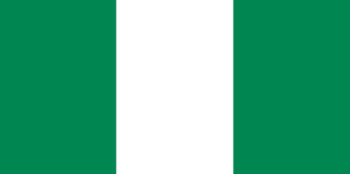
Flag of Nigeria
Ombudsmen in the United States are few and far between, but abroad, news outlets are continuing to appoint people to serve as an independent representative of the public in an ombudsman or readers representative role.
Earlier this month, Nigerian newspaper the Premium Times announced it hired seven people to serve as an ombudsmen panel for the newspaper to independently review reader concerns and rule on editorial and ethical breaches, as iMediaEthics previously reported. Ombudsmen, also known as public editors, typically serve independently of the news outlet’s editorial department to respond to complaints about news coverage.
iMediaEthics has heard back from Premium Times editor-in-chief/chief operating officer Musikilu Mojeed with responses to our questions about how the panel was established and will operate.
Below, read our full Q & A.
iMediaEthics: How were the seven ombudsmen selected?
Premium Times’ editor-in-chief Musikilu Mojeed: The seven ombudsmen are Amma Ogan, widely respected first substantive editor of The Guardian on Sunday and later co-publisher of the rested NEXT newspaper; Kole Shettima, a political scientist and development expert who currently works as regional director of the MacArthur Foundation at its Abuja office; Chidi Odinkalu, respected civic advocate, law academic, and former chairman of the National Human Rights Commission; Muazu Mohammed, a mass communication professor at the University of Maiduguri; Zainab Said Kabir, a sociologist and development specialist currently on academic tenure at the the Bayero University, Kano; Edaetan Ojo, a strong global voice on freedom of expression; and Ayo Obe, a lawyer, human rights activist, newspaper columnist and television presenter.
The members were chosen by our Board of Editors based on their expertise, competences, integrity and antecedents. We also considered diversity in terms of gender (three females, four males), and professions. The individuals are known and respected in Nigeria for their commitment to media ethics and freedom of expression.
Although it is a pro bono assignment, the members have committed to give their best to delivering on the Board’s mandate.
iMediaEthics: Do they report to the publisher or the editor? Can they be fired? Do they have contracts?
Premium Times: The board is completely independent. They do not report to the publisher or editor-in-chief. Members do not have contracts. The service they offer is on a pro bono basis, and they can decide to step down at any time. We are encouraging them to self-regulate themselves by putting in place a code of conduct for their Board. We expect that such code of conduct will guide the Board on what step to take if the actions or integrity of any member is called to question.
Members of the Board do not operate from our offices. All deliberations are to be done through a secure online platform dedicated for the purpose.
The Board is expected to forward its recommendations on complaints to the Editor-in-Chief, who will liaise with our managing editor and the editorial board for implementation.
iMediaEthics: Where will their reports be published? How often will they be published?
Premium Times: Their reports will be published on our website and other platforms willing to do so. Every report by the Board will be given publicity.
iMediaEthics: What is the contact information for readers who want to contact them regarding concerns?
Premium Times: Complaints are to be forwarded to members through complaints@premiumtimesng.com. All members will receive complaints in their emails simultaneously as they are sent in. Complaints posted to our offices will, immediately on receipt, be emailed to members.
iMediaEthics: What prompted the decision to appoint the seven ombudsmen?
Premium Times: Our Publisher, Dapo Olorunyomi, gave reasons in the press statement announcing the formation of the Board. He said the case of a public oversight over journalism is consistent with the idea of making integrity and accountability the DNA of our editorial process and outcome.
“Without an independent professional oversight over a journalistic enterprise, the professional will be prone to egregious abuses and ethical failures that defeat the aspiration of a media that will support democratic development,” he said.
“Important and welcome as the mechanism of the ombudsman is, we cannot yield such a noble enterprise to the dictates of governments or the business, political or cultural elites whose vision often abridge the vision of an accountability media as governments.”
We prefer that a diversity of voices are on the table as decisions are made. We constituted an odd number board to allow decisions be reached through voting if necessary.
iMediaEthics: How will their decisions be made? As a panel with a 4-3 margin? Or will they independently handle complaints?
Premium Times: We are not telling the Board how to operate. But we expect that they will jointly deliberate on complaints, and vote if necessary.
iMediaEthics: Is there any more information regarding the ombuds program you can share?
Premium Times: Find below a draft guideline which the Board is presently considering. We will publicise it once it is approved by the ombudsmen.
Draft Guideline For Complaints About Premium Times Journalism and Journalists
PREMIUM TIMES subscribes to the Code of Ethics for Nigerian journalists as approved by the Nigerian Press Organisation on March 20, 1998.
But our journalists and other personnel are human beings, and therefore fallible. There could be occasional breaches of the Code or misconducts by our reporters and editors.
When these happen, we urge our readers, especially those affected by the articles we publish, or the behaviour of our journalists, to contact our managing editor via newsroom@premiumtimesng.com or idris@premiumtimesng.com.
Those not satisfied with the handling of their complaints by the managing editor can make a written submission to Premium Times Ombudsman Board, an independent seven-member oversight panel unveiled on May 3, 2017 to serve as advocate for our readers with regards to any professional or ethical flops by our journalists.
Those who can complain are persons or organisations who can convince the Ombudsman Board that they are personally affected by the published article or the behaviour of the journalist.
Complaints to the Board should be made in writing either by email (complaints@premiumtimesng.com) or by post to Premium Times Ombudsman Board, 53 Mambolo Street, Wuse Zone 2, Abuja, Nigeria.
Complainants must include links, screenshots or printed copies of the articles to their submissions. They must also show evidence that they complied with the first step of complaining to the managing editor.
Complaints must be made not later than one month from the date of publication of the affected articles or the alleged misbehaviour of the journalist in question.
Complainants are advised against publicity of their submissions in other media platforms until their complaints are decided upon.
If the subject matter of the complaint is already before a court, the Ombudsman Board may suspend hearing on it until the case is decided by the court.
The Ombudsman Board will ensure that complaints are resolved as quickly as possible.






